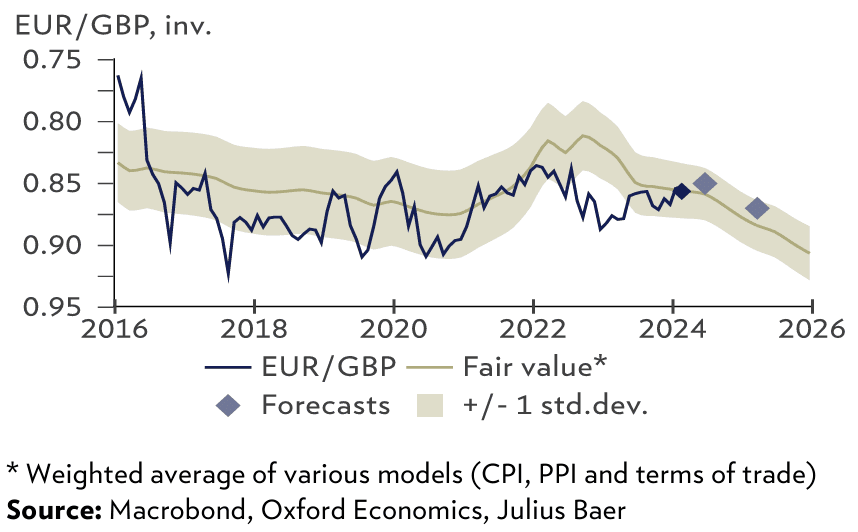GBP/EUR Exchange Rate: March Forecast
- Written by: Gary Howes

GBP/EUR at daily intervals
Pound Sterling edged lower against the Euro through the latter part of February, but we see ongoing resilience in March.
The Pound to Euro exchange rate fell 0.38% in February, despite having also hit its highest level since August 2023 earlier in the month.
Losses were triggered by the undershoot in UK inflation data mid-month, resulting in a gentle downtrend into the month's end.
Looking into March, we expect similar dynamics to stay in place through the early stages of the month, with downside potential being limited to the support line at approximately 1.1660.
Compare Currency Exchange Rates
Find out how much you could save on your international transfer
Estimated saving compared to high street banks:
£2,500.00
Free • No obligation • Takes 2 minutes
Limiting the potential for big moves is the low volatility environment comment to the wider FX market. Kit Juckes, an analyst at Société Générale, speaks of a "strangled" foreign exchange market. He explains that expectations for interest rate cuts at the largest central bank are moving in lock-step, meaning little divergence in performance between the currencies.
The Pound is still 1.30% up on the Euro in 2024 thanks to the retreat in Bank of England interest rate cut expectations seen in January.
Economists expect the Bank to cut rates after the European Central Bank, which should underpin the Pound going forward.
"Despite the technical recession, the GBP remains resilient. Recovering momentum supports our view of a late-cutting BoE. A small rise in rate differentials will likely help to stabilise the GBP," says David Alexander Meier, an analyst at Julius Baer in Zurich.
Above: Fair value calculations from Julius Baer suggest the EUR/GBP will trend lower over the coming months (i.e. pound to euro will trend higher). Track GBP with your own custom rate alerts. Set Up Here
A potential source of near-term excitement could be next week's Spring Budget announcement from Chancellor Jeremy Hunt, which will see him attempt to boost confidence in the economy and potentially cut taxes.
These tax cuts will likely be limited owing to the state of UK finances but would offer a fiscal boost that can underpin the economic recovery in 2024 and discourage the Bank of England from cutting interest rates further.
The Bank is expected by the majority of analysts we follow to cut interest rates after both the European Central Bank and U.S. Federal Reserve, which would suggest the Pound can remain supported over the coming weeks.
However, should March inflation data undershoot expectations, as was the case in February, we could see these assumptions challenged, leading to a weakening in the Pound.
But as mentioned, weakness is likely to be short-lived.
Further tests of resistance at 1.1760 will be on the cards if the mid-month official UK data releases confirm the UK economy returned to growth in January and February.
Incoming survey data (particularly the PMIs) suggest the economy expanded in January and February, and this should be reflected in ongoing tightness in the official labour market figures and GDP numbers.
"The UK was in a technical recession in H2 2023, as inflation hit consumption and exports declined. Leading indicators signal that the worst is over and point to a modest recovery in 2024," says Meir.
Compare Currency Exchange Rates
Find out how much you could save on your international transfer
Estimated saving compared to high street banks:
£2,500.00
Free • No obligation • Takes 2 minutes





